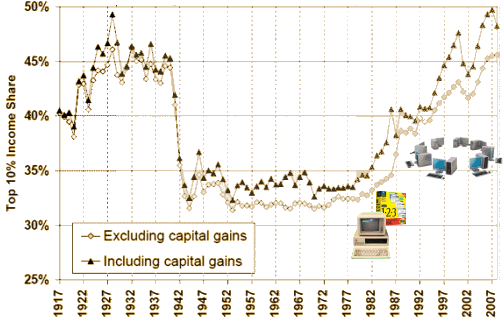"… before computers we witnessed technological revolutions brought on by the advent of the automobile, the airplane, radio, television, the washing machine, the Xerox machine, and too many other devices to name. Most of these earlier inventions had much the same effect as the computer—that is, they increased demand for progressively higher-skilled workers. But (with the possible exception of radio) none of these consumer innovations coincided with an increase in inequality".
I don’t think that’s right. I don’t mean that what Noah says is wrong, I just don’t think he was looking at all of the parameters. In 1981, the IBM PC came on the market and with it came Spreadsheets [Visicalc and later Lotus 123]. So people like me could make models. My first model was of buying a building with a friend. We figured out what kind of rent we could charge, and used the operating expenses from the building I was practicing in. Then we found out things like property taxes and loan interest rates. I was just playing around learning Lotus, and built a model that allowed us to try out various down payments, rental fees, loan interest rates. When we looked at it, if the two of us put down $40,000 each, we could buy a $325,000 building that would pay for itself without further investment and after 15 years, we would have a building worth $480,000. That came out to a return of a bit over 12% interest on our investment, compounded monthly. We couldn’t get that anywhere else at the time, so we actually did it – bought the building. To our wonder and amazement, it worked out even better than our estimate. Prior to 1981, I couldn’t have figured that out. It just wasn’t possible. We would have had no idea of whether it was a decent investment and wouldn’t have done it. The post payoff rental income is paying us about 5% and the building is in a popular complex where values continue to appreciate.
The point isn’t whether you think this was a good investment or not. The point is that a computer hobbyist like me in the early 1980’s could suddenly model an investment using simple software that I was just learning to use. Without it, I never would’ve thought of making such a move. Think about all the precision that such modeling brought to business with people who were really experts with software a lot more sophisticated than Lotus 1-2-3. Now multiply that times thirty years. The coming of computers and their modeling capacity, their database capacity, and their speed changed the way people approached business – constantly tweaking everything about their companies, their investments, their money management. All of that happened at the top, and I think it had a lot to do with the upward flow of money. Noah says, "Most of these earlier inventions had much the same effect as the computer—that is, they increased demand for progressively higher-skilled workers. But … none of these consumer innovations coincided with an increase in inequality". That seems absurd to me. Personal computers came into wide use in the early 1980’s, and the Income Inequality started rising immediately.

The tools for refined business management and investing were the building blocks for today’s highly automated and refined capitalism. Looks to me like the coming of the ubiquitous computers and their software power to business increased profitability that funneled money straight up to the people at the top. It’d be hard to convince me that computing power wasn’t a factor. You can’t run a hedge fund with a slide rule…

 The segment, Computer Exceptionalism, in Slate‘s The United States of Inequality concluded
The segment, Computer Exceptionalism, in Slate‘s The United States of Inequality concluded

Just had to point you to John Richardson’s blog in Esquire magazine “The Stink of Desperation:Why Republicans Lie”. The article is terrific.
Thanks. That’s a terrific smack-down. I pray he’s right…
[…] Divergence 2. The Usual Suspects Are Innocent 3. Importing Inequality 4. Computer Exceptionalism wealth inequity revisited… more about wealth inequity… 5. Too Many Republicans wealth inequity: big labor got […]